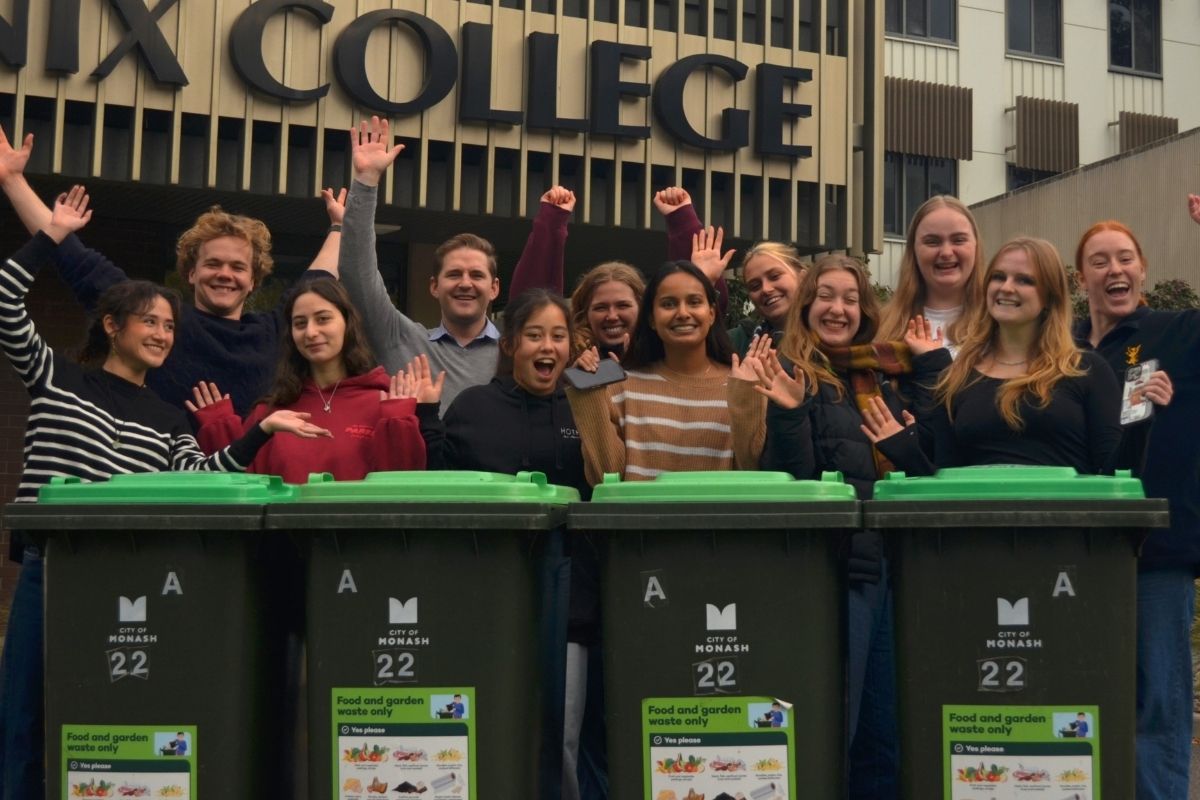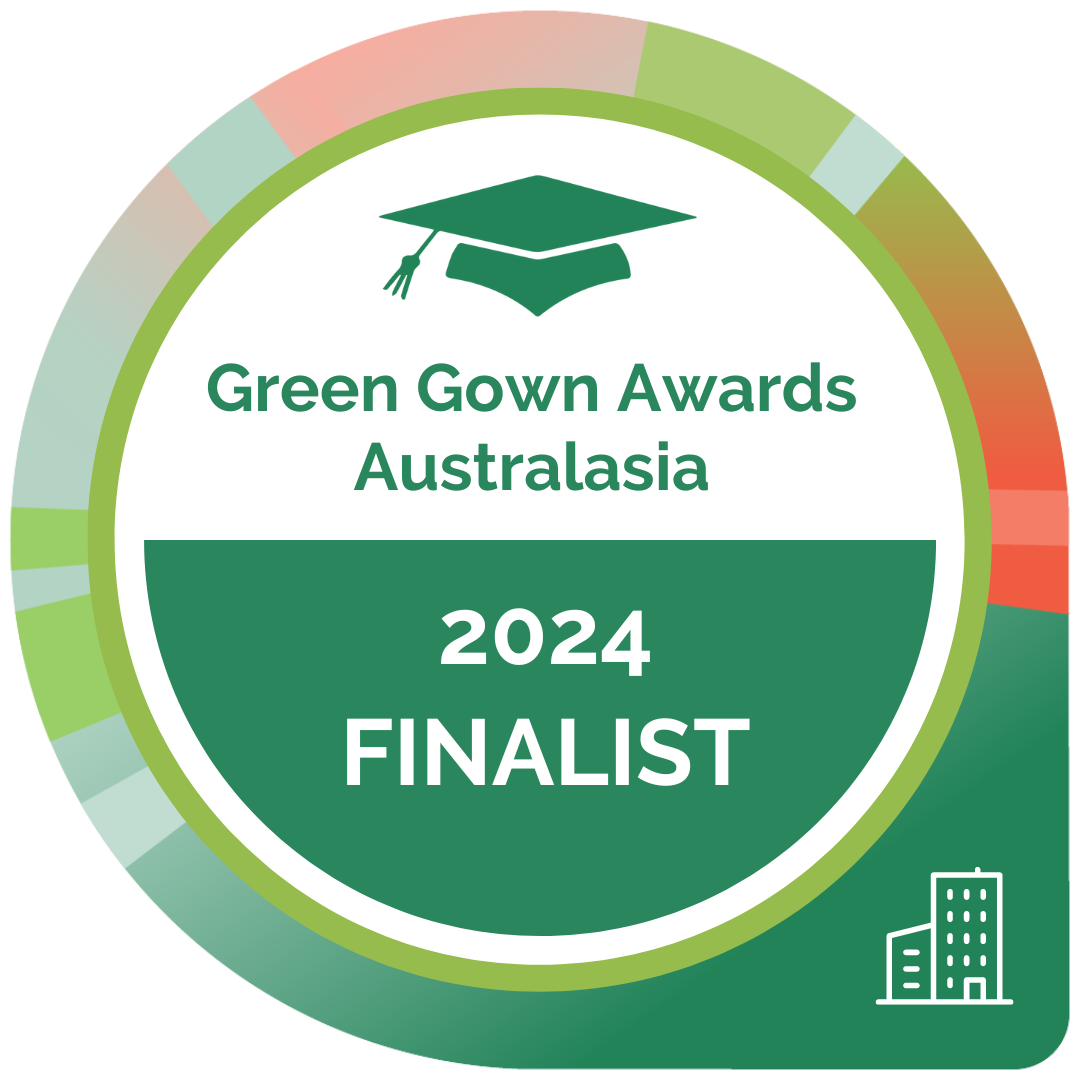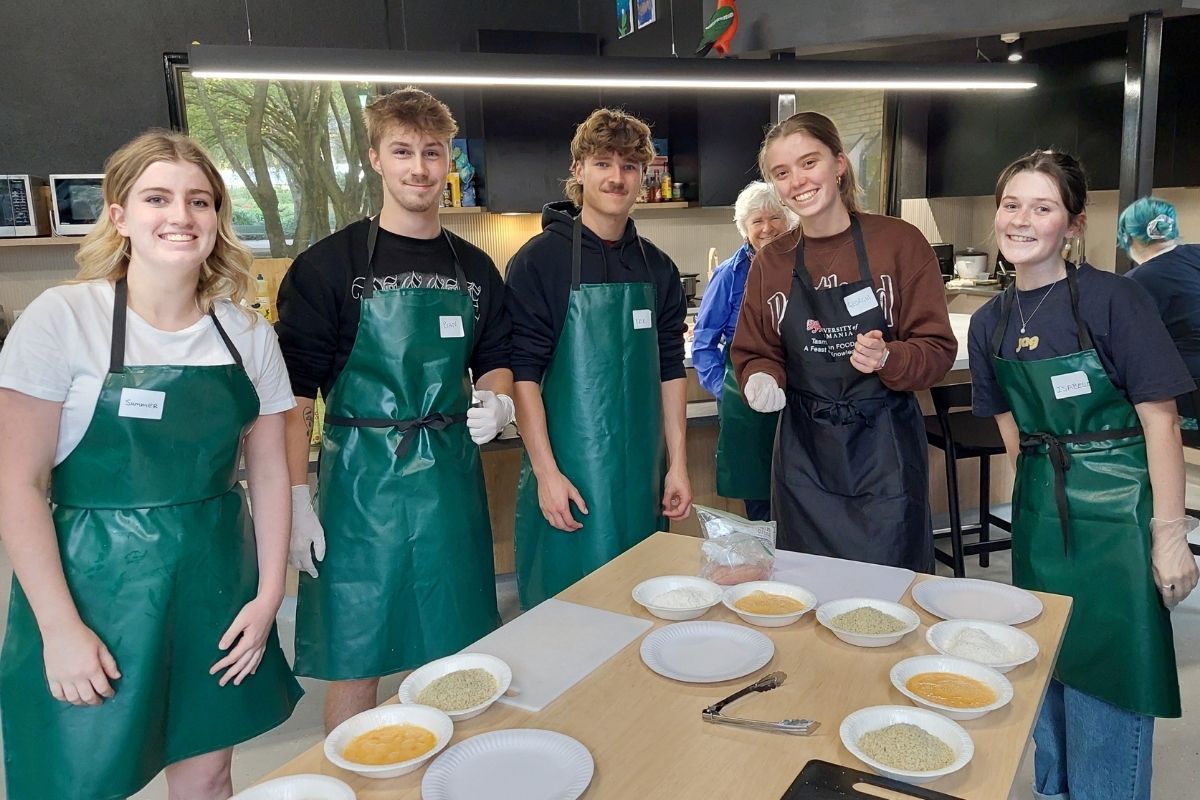Student Engagement category
Mannix College, affiliated with Monash University has launched the “Green Cuisine: Waste Not Want Not” initiative, a student-driven project aimed at revolutionising food and organic waste management within the college. Spearheaded by the Environment & Sustainability Advisory Committee and supported by Monash City Council, the initiative focuses on reducing food waste in the college’s dining hall. The project introduced organic waste bins, resulting in a 60% reduction in food waste and diverting 9,600 kg of organic waste from landfills in six months. This initiative significantly reduces the college’s environmental footprint and promotes sustainability within the campus community.

Environmental and Social Benefits
- CO2 Emissions Reduction: By diverting 9,600 kg of organic waste from landfills, the initiative has prevented 15.84 tonnes of CO2 equivalent emissions in just six months. The project is projected to prevent 31.68 tonnes of CO2e annually.
- Circular Economy Promotion: The initiative contributes to the circular economy by transforming food waste into 3,840 kg of nutrient-rich compost, which supports local agriculture and reduces the need for chemical fertilisers.
- Community Engagement: The project has fostered a strong sense of community among students and staff, raising awareness and encouraging eco-conscious behaviours within the college.
Leadership and Engagement
- Student-Driven Initiative: The project is distinctive for its student-led approach, with the Environment & Sustainability Advisory Committee playing a central role in planning, executing, and monitoring the initiative. Students led educational campaigns, workshops, and social media projects to promote awareness and proper waste segregation.
- Collaboration with Local Authorities: The partnership with Monash City Council was crucial in implementing the project, providing organic waste bins and composting services. This collaboration ensured the project’s success and demonstrated the importance of local government partnerships in achieving sustainability goals.
- Active Participation: Over 300 students and 20 staff members participated in the project, with all members of the college community contributing to the initiative’s success. The collective effort highlights the importance of community-wide engagement in sustainability projects.
Significance to the Sector
- Innovative Model: The initiative is the first of its kind in Australia, showcasing a successful partnership between a residential college and a local city council. The project’s comprehensive approach and significant environmental impact make it a model for other institutions to replicate.
- Scalability and Replicability: The project’s success at Mannix College demonstrates its potential for replication across other university campuses and student accommodation providers. With 30,000 university students living in catered accommodation in Australia, the initiative has the potential to make a significant impact on a national scale.
- Contribution to SDGs: The initiative aligns with the UN Sustainable Development Goals (SDGs), particularly Goal 12 (Responsible Consumption and Production) and Goal 13 (Climate Action), by promoting sustainable waste management practices and reducing the carbon footprint.
Wider Societal Impact
- Educational Impact: The initiative has equipped students with valuable skills in project management, leadership, and sustainability, preparing them to be environmentally responsible leaders in their future careers. The program’s success has also inspired similar initiatives within the wider community, promoting sustainable practices beyond the college.
- Long-Term Sustainability: The project has set a precedent for long-term sustainability within the college. Future plans include leveraging data analytics to optimise waste management efficiency, ensuring continuous improvement, and maintaining the initiative’s impact over time.
- Broader Influence: The initiative’s principles and practices are relevant to other sectors, such as hospitality, healthcare, and schools, which face similar waste management challenges. The project’s success at Mannix College provides a replicable model that can be adapted to various contexts, promoting sustainability on a broader scale.
The “Green Cuisine: Waste Not Want Not” initiative at Mannix College, affiliated with Monash University, exemplifies a successful, scalable approach to sustainable waste management in a student accommodation setting. Through student leadership, strategic partnerships, and community engagement, the initiative has significantly reduced the college’s environmental footprint and fostered a culture of sustainability within the campus community. This project serves as a model for other institutions and sectors, demonstrating the powerful impact of collective action in achieving environmental goals.
Top 3 learnings
Supported by

Category finalists
Student Engagement/Winners
Student Engagement/Winners
Past winners
Benefitting Society/Winners
Benefitting Society/Winners
Diversity, Equity & Inclusion in Sustainability/Winners
Diversity, Equity & Inclusion in Sustainability/Winners
Climate Action/Winners
Climate Action/Winners
Sustainability Institution of the Year/Winners
Sustainability Institution of the Year/Winners
Creating Impact/Winners
Creating Impact/Winners
Creating Impact/Winners
Creating Impact/Winners
Top 3 learnings
Student Engagement category
Mannix College, affiliated with Monash University has launched the “Green Cuisine: Waste Not Want Not” initiative, a student-driven project aimed at revolutionising food and organic waste management within the college. Spearheaded by the Environment & Sustainability Advisory Committee and supported by Monash City Council, the initiative focuses on reducing food waste in the college’s dining hall. The project introduced organic waste bins, resulting in a 60% reduction in food waste and diverting 9,600 kg of organic waste from landfills in six months. This initiative significantly reduces the college’s environmental footprint and promotes sustainability within the campus community.

Environmental and Social Benefits
- CO2 Emissions Reduction: By diverting 9,600 kg of organic waste from landfills, the initiative has prevented 15.84 tonnes of CO2 equivalent emissions in just six months. The project is projected to prevent 31.68 tonnes of CO2e annually.
- Circular Economy Promotion: The initiative contributes to the circular economy by transforming food waste into 3,840 kg of nutrient-rich compost, which supports local agriculture and reduces the need for chemical fertilisers.
- Community Engagement: The project has fostered a strong sense of community among students and staff, raising awareness and encouraging eco-conscious behaviours within the college.
Leadership and Engagement
- Student-Driven Initiative: The project is distinctive for its student-led approach, with the Environment & Sustainability Advisory Committee playing a central role in planning, executing, and monitoring the initiative. Students led educational campaigns, workshops, and social media projects to promote awareness and proper waste segregation.
- Collaboration with Local Authorities: The partnership with Monash City Council was crucial in implementing the project, providing organic waste bins and composting services. This collaboration ensured the project’s success and demonstrated the importance of local government partnerships in achieving sustainability goals.
- Active Participation: Over 300 students and 20 staff members participated in the project, with all members of the college community contributing to the initiative’s success. The collective effort highlights the importance of community-wide engagement in sustainability projects.
Significance to the Sector
- Innovative Model: The initiative is the first of its kind in Australia, showcasing a successful partnership between a residential college and a local city council. The project’s comprehensive approach and significant environmental impact make it a model for other institutions to replicate.
- Scalability and Replicability: The project’s success at Mannix College demonstrates its potential for replication across other university campuses and student accommodation providers. With 30,000 university students living in catered accommodation in Australia, the initiative has the potential to make a significant impact on a national scale.
- Contribution to SDGs: The initiative aligns with the UN Sustainable Development Goals (SDGs), particularly Goal 12 (Responsible Consumption and Production) and Goal 13 (Climate Action), by promoting sustainable waste management practices and reducing the carbon footprint.
Wider Societal Impact
- Educational Impact: The initiative has equipped students with valuable skills in project management, leadership, and sustainability, preparing them to be environmentally responsible leaders in their future careers. The program’s success has also inspired similar initiatives within the wider community, promoting sustainable practices beyond the college.
- Long-Term Sustainability: The project has set a precedent for long-term sustainability within the college. Future plans include leveraging data analytics to optimise waste management efficiency, ensuring continuous improvement, and maintaining the initiative’s impact over time.
- Broader Influence: The initiative’s principles and practices are relevant to other sectors, such as hospitality, healthcare, and schools, which face similar waste management challenges. The project’s success at Mannix College provides a replicable model that can be adapted to various contexts, promoting sustainability on a broader scale.
The “Green Cuisine: Waste Not Want Not” initiative at Mannix College, affiliated with Monash University, exemplifies a successful, scalable approach to sustainable waste management in a student accommodation setting. Through student leadership, strategic partnerships, and community engagement, the initiative has significantly reduced the college’s environmental footprint and fostered a culture of sustainability within the campus community. This project serves as a model for other institutions and sectors, demonstrating the powerful impact of collective action in achieving environmental goals.
Supported by

Related finalists
Student Engagement/Winners
Student Engagement/Winners
Other finalists
Climate Action

Driving Towards Tomorrow’s Campus with Vehicle-to-Grid EV Technology
As part of Flinders University’s drive to innovate and become a leader in climate action, the University launched its Vehicle-to-Grid (V2G) initiative. This involved installing and maintaining 20x V2G and smart chargers for its growing electric vehicle fleet. Leveraging 100% renewable energy generated by ENGIE’s Willogoleche Wind Farm and Flinders University’s solar power systems, this enables the storage of renewable energy in EV batteries to be discharged on campus during peak demand periods. Hence, allows for these EV fleets to operate as a Virtual Power Plant (VPP) to deliver peak demand management and optimization of behind-the-meter generation.
Overall, this initiative demonstrates the reliability and scalability of bi-directional and uni-directional smart-charging systems for EVs in reducing GHG emissions while facilitating teaching, research, and innovation opportunities. Moreover, it exemplifies a sustainable and innovative solution to scale energy storage technology and increase renewables.
Sustainability Champion – Staff/Winners

Brandan Espe
Environmental Officer / Acting Grounds Supervisor
Brandan has brought over 50 federally listed Endangered species of plant into the James Cook University living collection, many of which have never been cultivated and are found in no other collection in the world.
Of these, over half have been sustainably wild collected, inclusive of field and clone data, so they can be used for ongoing conservation, research and teaching, the remaining being sourced from private and partner organisations through favours of service or trades.
He personally funded the project from 2019-2022, until funding was awarded for the program due to its success, with the program now being engrained into the Universities landscapes for ongoing management should he leave JCU, creating a threatened species legacy collection.
The program has now expanded beyond this, with an additional 48 species now funded for further addition, some of which are only known from less than 5 sightings in history.
Student Engagement

Sustainability Leaders creating real impact!
La Trobe created a unique Sustainability Leaders volunteering program to increase engagement with students on campus and empower them to act against waste and promote sustainability. It included the following initiatives:
- Promoting the reusable crockery implementation,
- Increasing knowledge action of other students on campus to diversion comingled recycling and organic waste from landfill.
- Focus on waste audits and data,
- Improved signage through new waste posters for students living on campus.
- Collaboration with Cirka (our cleaning and waste partner) to create a waste wall and;
- Learning all things sustainability (net zero, biodiversity, waste, reusables, engagement)
These initiatives yielded significant results and with a reduction in waste contamination by almost 40% at the residential buildings and engagement with over 80 groups of people for the Reusable Revolution.
Creating Impact

Where knowledge meets habits: Empowering students for a sustainable tomorrow
Our online Sustainability Challenges offer participants an engaging, self-paced learning experience centered around a specific United Nations Sustainable Development Goal (UNSDG). Requiring minimal resourcing and at zero-cost to participants, we’ve created replicable, compact, scalable, and impactful learning opportunities that result in real impact.
The Challenges follow a structured process that moves participants from knowledge gain to simple action to celebration, to establish small but mighty habits relating to waste and carbon emissions. This approach recognises that knowledge alone is often insufficient to drive behaviour change, and that ease of action and celebration are crucial components in creating sustainable habits.
Sustainability Champion – Staff/Winners

Catherine (CeeJay) Donovan
Veterinary nurse – Anaesthesia
From establishing the Massey Vet School Green Team to leading impactful initiatives, my commitment to environmental sustainability has been making waves. With the help of my team, I have accomplished numerous small, yet meaningful actions, including integrating a sustainability lecture for final year vet students and implementing battery recycling alongside rechargeable battery use. Our larger projects encompass the introduction of green waste and soft plastics recycling bins, an energy audit resulting in power-saving measures, and playing a part in a successful rubbish audit. I spearheaded the ‘6 in 6’ campaign, empowering individuals with six simple steps for workplace sustainability. Through the SustainaVet social media pages I help to educate and inspire peers nationwide. As the Massey School of Veterinary Science sustainability champion, I had the privilege of speaking at the annual veterinary conference on sustainability in clinical practice. Currently I’m conducting pioneering research on responsible cat waste disposal. Together, we’re forging a greener future, one initiative at a time.
Sustainability Champion – Student

Louis Walmsley
SDG Coordinator Monash Association of Sustainability, Office Bearer Monash Student Association’s Environmental and Social Justice Department, Masters of Environment and Sustainability Student
Louis is an exceptional student sustainability leader at Monash University. His passion and dedication to sustainability have made a significant impact on the community. Louis’s values revolve around sustainability, which is evident upon meeting him. He actively participates in various sustainability groups, demonstrating his commitment to creating a more environmentally conscious society.
One of Louis’s notable involvements is with Precious Plastic Monash, where he organizes remarkable events and fosters collaboration among like-minded individuals, student groups, and staff. His contributions to the Monash Association of Sustainability have allowed him to conduct valuable research on plastic usage and climate action, resulting in positive changes within the university.
Through his work with the Monash Student Association, Louis has engaged hundreds of students in fun and interactive sustainability initiatives. He took the initiative to organize a sustainability food fair, which was one of the largest sustainability-related events held at Monash post-COVID. This accomplishment is a true testament to Louis’s hard work and creativity.
Louis is an outstanding student leader whose efforts in sustainability have had a lasting impact on Monash University and its community. His inspiring nature resonates with everyone who knows him.











